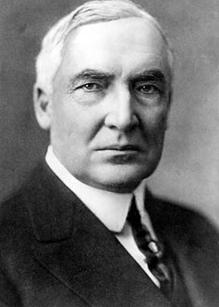Get Today in Masonic History into your Inbox. Sign up today for one of our email lists!
Need an article for your Trestleboard/Newsletter see our Use Policy
Warren Gamaliel Harding Passes Away

Today in Masonic History Warren Gamaliel Harding passes away in 1923.
Warren Gamaliel Harding was an American politician and 29th President of the United States.
Harding was born in Blooming Grove, Ohio on November 2nd, 1865. He was nicknamed "winnie" from a young age. Although the family claimed it to be untrue, one of Harding's great-grandmothers was African-American. Various African-Americans have come forward over the years claiming to be a relative of Harding. He graduated from the Ohio Central College in Iberia in 1882. During his final year the family moved to Marion, Ohio where he lived the majority of his life.
At the age of 18, Harding, along with a couple of friends bought the Marion Star, one of three local papers. The Star was the worst performing of the three and the only daily paper in Marion. After some tough starts, he got the paper running and making a profit. The town of Marion tended to vote Republican, Marion County was decidedly Democrat though. To help the paper get advertisers, he kept the articles and editorials more centrists with a slight Republican lean.
It was through the Star, he met his wife, Florence King. Florence came to Harding's attention because of her father, for who Harding had a strong dislike. Harding attacked Florence's father in the paper repeatedly. Florence's father was a local banker and was used to getting what he wanted. Eventually Harding and Florence wed. They had no children, they were a power couple though in the true sense of the words. Florence helped Harding run the newspaper when he went out of town for speeches and other business. It was said Florence motivated, in some situations forced, Harding into the positions and successes he achieved, including the White House.
In 1899, Harding was elected to the Ohio State Senate. He was elected twice and served a total of 4 years in the Senate. In 1903, he announced his run for the Governor's office. Republican leadership felt Harding was un-electable in the new Progressive Era. They convinced him to run for Lieutenant Governor, he successfully won the position. In 1905, he announced his run for the Governor's office again. This angered many in the Ohio Republican party since the sitting Governor was a Republican as well. Harding did not feel he was getting the job done. He was eventually convinced not to run and sought no office in 1905.
In 1914, after the passing of the Seventeenth Amendment which allowed states to elect their senators, Harding entered the Republican Primary for the position and easily won the nomination. He went up against Timothy Hogan who was seen by some in Ohio as an outsider and worse at the time in Ohio, a Roman Catholic. Propaganda sheets were spread around claiming Hogan was the vanguard of a plot led by Pope Benedict XV through the Knights of Columbus of Ohio. Harding won the general election and become the Junior Senator from Ohio.
At the end of World War I, Harding was opposed to the Treaty of Versailles, specifically the portion about the League of Nations. Many disliked Article X which required all members of the League of Nations to come to the aid of any other member nation if they were attacked. To Harding and others, this was essentially taking the United States Senate out of any decision process of whether the country went to war. In 1920, he gave a speech against the Treaty and it was defeated in the Senate.
In 1920, Harding sought the Republican nomination for President. He received it and won the general election. During his short term in office he officially ended World War I for the United States. He still had to deal with the League of Nations which he still opposed. Eventually in 1922, he began dealing with the league on a diplomatic footing. He called for disarmament of the United States stating congress should "be unmindful of the call for reduced expenditure" on defense.
Harding seemed inclined to do more for African Americans than previous Republicans. He directed his cabinet members to find positions in their departments for African Americans. He also gave a speech in Birmingham, Alabama to a segregated audience of 20,000 whites and 10,000 blacks. In the speech he stated the social and racial differences between blacks and whites could not be bridged, political rights should be equal for all. He also stated literacy tests for voting continue as long as they were fairly applied to African American voters. During the speech White audience members stood in silence while black audience members cheered. The cheering slowed though in 1922, when an anti-lynching bill was brought before the Senate which Harding favored. Southern Democrats filibustered and the bill was pulled so another bill could be put forward. The second bill was defeated as well. African American voters blamed Harding for the failure.
Harding passed away in San Francisco after heart problems and pneumonia which he had for close to week before passing. The official cause of death was cerebral hemorrhage. He passed away on August 2nd, 1923.
Harding was a member of Marion Lodge No. 70 in Marion, Ohio.
This article provided by Brother Eric C. Steele.

